Iran Protests On Agenda Of G7 Foreign Ministers Summit
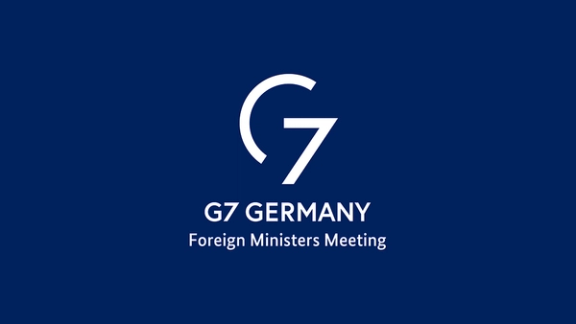
Foreign ministers of the Group of Seven (G7) are set to discuss Iran’s crackdown on antigovernment protesters when they open two days of talks in Germany this week.

Foreign ministers of the Group of Seven (G7) are set to discuss Iran’s crackdown on antigovernment protesters when they open two days of talks in Germany this week.
The top diplomats of the world’s major industrialized democracies — Britain, Canada, France, Germany, Italy, Japan and the United States -- are scheduled to hold meetings in the town hall of the western German city of Munster on Thursday and Friday.
In addition to the Islamic Republic’s brutal crackdown on the ongoing protests, ignited by the death in custody of 22-year-old Mahsa Amini, they will be talking about Tehran’s supplying Russia with armed drones and other weapons for use in Ukraine.
In a press briefing Tuesday, United States State Department spokesman Ned Price faced questions as to what the US planned to do over alleged Iranian arms supplies to Russia. He said the US was pursuing “every relevant and appropriate tool in our tool kit” to curb Iran’s reported supply of military drones, including sanctioning Iranian commanders and defense companies.
The G7 foreign ministers from the Group of Seven nations will also grapple with the implications of Russia’s invasion of Ukraine and China’s growing economic clout.
In mid-October, gender equality ministers G7 expressed "solidarity with the people rallying in Iran against the violations and abuses of their human rights and fundamental freedoms."
Meanwhile, the number of signatures in an online campaign aimed at the leaders of the seven industrialized countries of the world, G7, has surpassed 720 thousand. The petition calls on these countries to recall their ambassadors from Iran and expel diplomats and officials of the Islamic Republic.
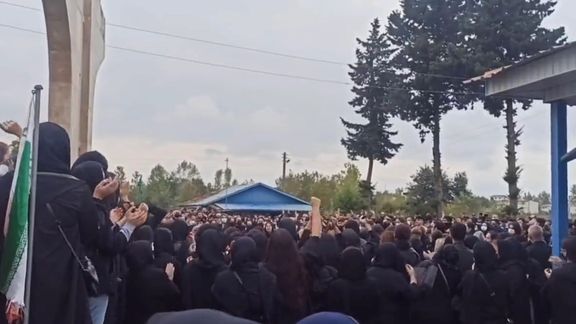
Iranians once again braved the violent crackdown by the Islamic Republic and poured into streets Wednesday evening, amid threats of death sentences for protesters.
In the central city of Isfahan, angry protesters held rallies near Chaharbagh neighborhood while city officials had cut the electricity in several districts.
People in Tabriz took to streets and in Mashhad, northeast, demonstrators set fire at billboards to show anger at government brutality.
Youths in Bukan in West Azarbaijan province blocked the transit road to Tabriz by lighting fires. In the Kurdish city of Marivan demonstrators were chanting that they will not stop their fight against the authoritarian rule.
Videos show that protesters used a mosque loudspeaker to invite their fellow citizens to join them in their movement.
In the city of Mahabad in West Azarbaijan some overnight protests were staged with people lighting fires and blocking streets.
People in Shiraz published some fliers to call for a protest rally on Thursday.
Earlier in the day, a huge crowd of people attended a mourning procession of a young woman who was killed by security forces forty days ago in the northern city of Nowshahr.
Reports say many people travelled from several other cities to commemorate Hannaneh Kia. They chanted “Death to Khamenei,” and “Death to Dictator.” Videos on social media show that regime forces fired tear gas near the house of the victim.
Videos on social media show people in Qazvin took to streets after nightfall. In capital Tehran women chanted antigovernment slogans on the subway and residents in Ekbatan district repeated their nightly vigil and chanted antigovernment slogans from their windows despite attacks by plainclothes who fired at buildings during the past few nights.
Some other videos show use of violence against peaceful demonstrators in Chitgar neighborhood in western capital.
On Wednesday afternoon, doctors, residents, and medical students of Tehran’s Khomeini Hospital also gathered in front of the Tehran Medical Council chanting slogans in support of the uprising and protested the brutal treatment of medical staff.
The Center for Human Rights in Iran (CHRI) in a statement on Wednesday urged the international community to warn the Iranian authorities against issuing death sentences against detained protesters.
“Issuing death sentences against the protesters—after the Iranian authorities have unlawfully arrested tens of thousands of peaceful protesters and killed hundreds through the indiscriminate use of lethal force to squash the protests—is a blatant attempt to terrorize the Iranian people into silence; it will cement the Islamic Republic’s status as an outlaw state that has no regard for law or life,” said Hadi Ghaemi, CHRI executive director.
In a meeting Monday, Tehran Province Prosecutor Ali Alghasi Mehr said some 1,000 indictments had been issued in connection with recent “riots”.
In the same meeting, Judiciary Chief Gholam-Hossein Eje’i said, “Those who intend to confront and subvert the regime are dependent on foreigners and will be punished according to legal standards,”suggesting that some protesters would be charged with collaborating with foreign governments.
The Islamic Republic has repeatedly made claims that “foreign enemies” have provoked the unrest without any evidence.
On Sunday, the Iranian regime charged six people in Tehran with “waging war,” “corruption on earth,” “assembly and collusion against national security” and “confronting the Islamic Republic” for participating in the protests.
“Waging war” and “corruption on earth” are charges that can lead to a death sentence.
“Death sentences against people for exercising their right to freedom of expression, after the killings of peaceful protesters, abductions and gunning down of children, and other atrocities, indicate a government that is out of control and willing to squash protest at any cost,” said the statement by Center for Human Rights in Iran.
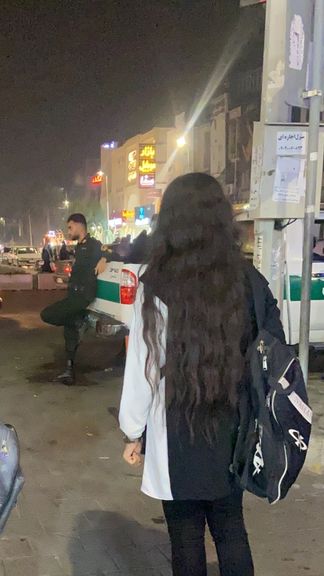
Calls for expulsion of the Islamic Republic from the UN Commission on the Status of Women (CSW) are getting stronger with the US and the Netherlands joining the chorus.
US Vice President Kamala Harris said on Wednesday that Washington will try to remove Iran from the 45-member CSW over the government's denial of women's rights and brutal crackdown on protests.
The Islamic Republic is just starting a four-year term on the commission, which meets annually every March and aims to promote gender equality and the empowerment of women.
"The United States believes that no nation that systematically abuses the rights of women and girls should play a role in any international or United Nations body charged with protecting these very same rights," Harris said in a statement.
"Iran has demonstrated through its denial of women's rights and brutal crackdown on its own people that it is unfit to serve on this Commission," Harris said.
On Tuesday, the Dutch Senate adopted a motion calling on its government to “support any proposal” to remove the Iranian regime from the UN Women’s Rights Commission.
UN Watch, an independent non-governmental human rights group based in Geneva, has drafted a resolution for the 54-nation UN Economic Social Council (ECOSOC) to remove Iran.
A group of women leaders in business, politics, and the arts from over 14 countries has called for the immediate expulsion of the Islamic Republic from the UN Commission.
In an open letter, published in The New York Times on Sunday, October 29, the preeminent leaders expressed their solidarity with Iranian women and girls, as well as men, who are holding daily protests for more than 40 days across the country and abroad following the death in custody of 22-year-old Mahsa Jina Amini.
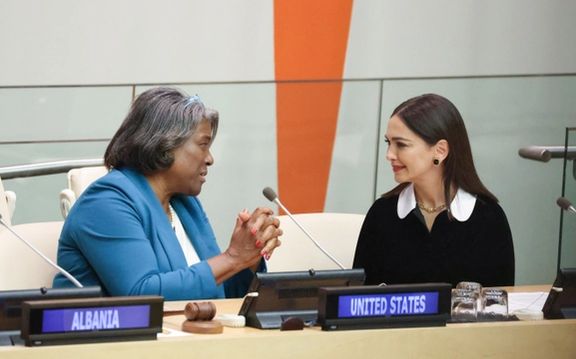
Nobel Prize winner Shirin Ebadi Wednesday urged the United States not to reach any agreement with Iran that would enable it to access additional funds.
While the lawyer has previously supported at least some sanctions against Tehran, Ebadi’s intervention comes not only after six weeks of protests in Iran but with the US in recent weeks showing hesitancy toward talks aimed at reviving the JCPOA (Joint Comprehensive Plan of Action). Under a restored JCPOA, Iran would gain access to funds frozen abroad and lifting of US sanctions in return for curbing its nuclear program.
Ebadi was addressing an ‘Arria’ meeting of the United Nations Security Council, an informal gathering sponsored by members of the council or other states to allow informative input from experts or non-state groups. The meeting was sponsored and introduced by US ambassador Linda Thomas-Greenfield and Albanian ambassador Ferit Hoxha to discuss weeks of protests in Iran following the September 16 death of Mahsa Amini after arrest by Tehran ‘morality police.’
Speaking virtually from London, Ebadi said the “demands for justice” by the Amini family had “so far yielded no results.” Ebadi called on “western governments and especially the United States of America to refrain from subscribing [to] any type of agreements that will help the survival of the regime, as the Islamic Republic does not spend the funds for the welfare of the people but on the contrary provides and buys more weapons, which in turn cause more killing in Iran and the region.”
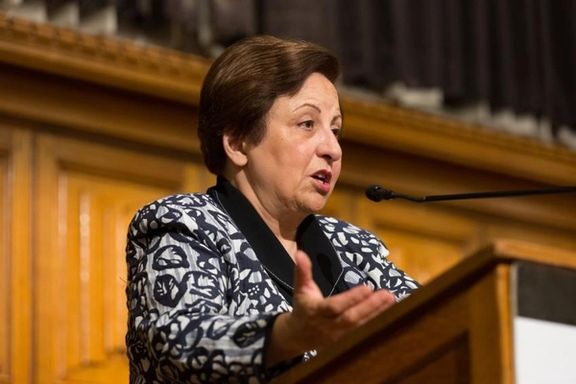
Ebadi, who left Iran in 2009, said the UN should set up an investigation into “recent repressions in Iran,” citing the 2017 precedent of Myanmar, and demanded the withdrawal of ambassadors of the “governments of the free world” from Iran with their representation reduced to charge d’affaires. She called for the removal of Iran from the UN Commission on the Status of Women, and for the establishment of a “democratic and secular government.”
Also addressing the Arria meeting virtually, the US Special Rapporteur on Human Rights in Iran Javaid Rehman highlighted an “absence of accountability” in Iran, arguing that official investigations into Amini’s death had “failed to meet the minimum [standards] required.”Rehman argued Iranian family law, the age of criminal responsibility, and employment practices were all discriminatory, creating a situation of “gender apartheid.”
‘Powder-keg moment’
Rehman called for an international “independent investigative mechanism” to investigate the state’s response to six weeks of protests, in which he said at least 277 people had been killed, including 67 in Sistan-Baluchestan province.
The third speaker, Iran-born Hollywood actress Nazanin Boniadi, who was present in New York, called Amini’s death a “murder” that had been “the powder-keg moment that ignited this most recent uprising.” She said that the slogan ‘Woman, Life, Freedom’ was a “declaration of opposition to a regime…built on being anti-women, pro-martyrdom, and repressive.”
Boniadi disputed the “myth…perpetuated by global pundits…that compulsory hejab is a cultural issue that we shouldn’t interfere with.” She also rejected “another myth, that this regime is reformable,” and argued that presidential and other elections could not “make a difference.” She said that “the potential for the current protests to transform Iran from theocracy to representative government could be a geopolitical game-changer, and the single most important key to bringing about stability in the Middle East.”
US ambassador Thomas-Greenfield, sitting in front of White House Special Envoy Rob Malley, said the US would support an international investigation into human rights in Iran, and had already sanctioned Iran’s ‘morality police.’ Arria meetings, first established in 1992 by Venezuelan Ambassador Diego Arria, have sometimes led to UN Security Council resolutions.
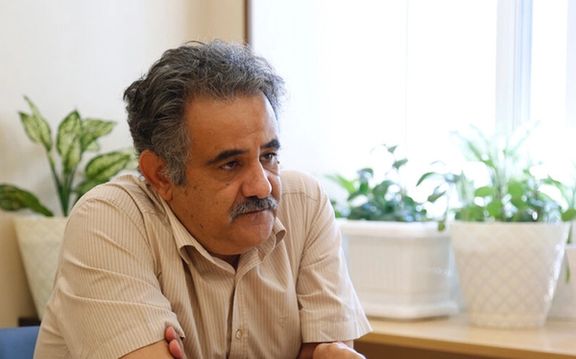
Iranian economist Davood Souri, an alumnus of the Virginia Polytechnic University and a tenured professor at Tehran’s Sharif University, has been arrested by the Islamic Republic’s agents.
According to reports, security agents raided Souri’s home on Monday night and took him along with his laptop and mobile phone. He later managed to call his family and inform them he was taken to the Evin prison.
Earlier in the week, an economics PhD candidate of the same university, Mohammad Mollanouri, was also arrested.
The Islamic Republic’s security agents have been arbitrarily arresting many academics and journalists who are not even known to be political activists. Most of the detained intellectuals have done nothing but sympathize with the current wave of protests, ignited by the death in custody of 22-year-old Mahsa Amini. Some of them have been released on bail.
On Sunday, Iranian plainclothes agents abducted Dariush Farhoud, an 85-year-old professor of medical and clinical genetics known as the father of Iran’s genetics and released him after about two days of interrogation.
More than 2,300 academics from US universities urged President Joe Biden on Tuesday to do more to support the antigovernment protesters in Iran.
On Wednesday, the new UN human rights chief Volker Turk said in his first media briefing since taking office that there was a worrying pushback against progress in easing rights abuses, above all on gender issues, pointing to the Islamic Republic’s violent clampdown.
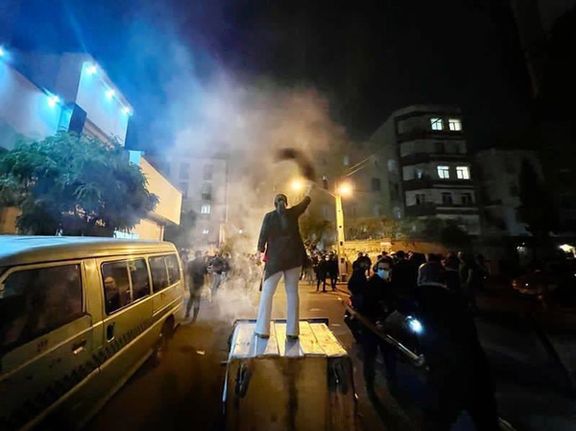
More than 2,300 academics from US universities have urged President Joe Biden to do more to support the antigovernment protesters across Iran.
In a letter sent to the president Tuesday, the academics, including more than 425 Iranian-American professors, called for “urgent attention to a dire situation in Iranian universities,” asking Biden to take “further tangible actions.”
They urged US president Joe Biden to “halt any and all negotiations with the Iranian regime, and prevent any sanctions relief under any pretext, directly or indirectly, until all violators of human rights in Iran are held accountable.”
The letter, signed by 10 Nobel laureates as well as many members of the Iranian diaspora, said that “An attack on the freedom of one university community is an attack on the freedom of all.”
Noting that demonstrations in more than 170 Iranian cities, including in over 100 universities, have been violently suppressed by the regime’s security forces since the outbreak of the uprising in Iran, they said that the repression is becoming harsher every day, and hundreds have been killed and thousands arrested so far.
“We also ask you to recognize the universally accepted right of the Iranian people to self-defense as they seek to attain sovereignty and self-determination,” they concluded.
In another similar measure, over 500 scholars launched a petition to demand the release of all activists, including students, from the prisons of the Islamic Republic, calling on the international scientific community to amplify the voices of those in Iran, scientific journal Nature reported.